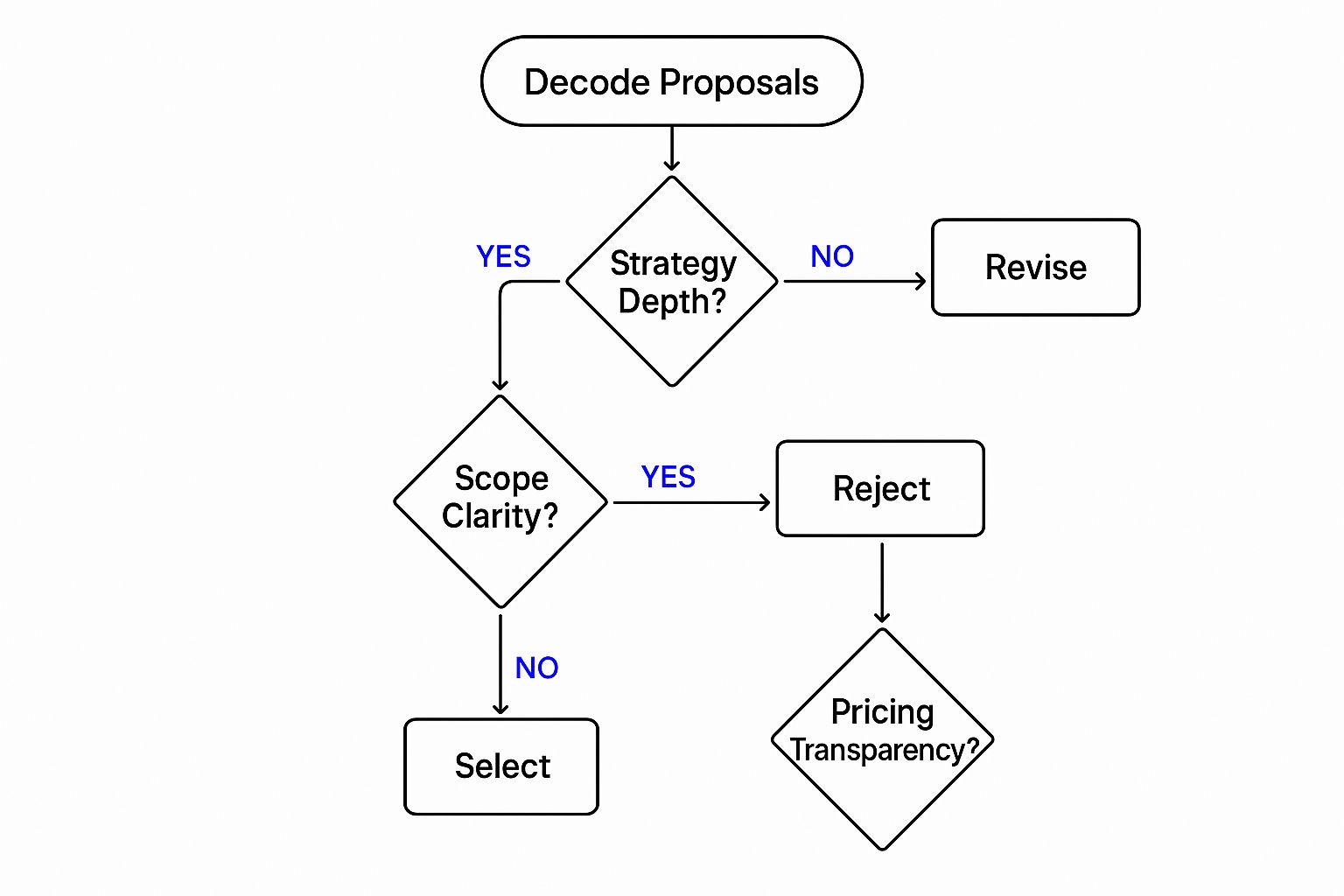How to Choose a Marketing Agency You Can Trust
Choosing a marketing agency is a big deal. It’s a partnership that can either supercharge your growth or drain your budget with little to show for it. The secret isn't just about picking the agency with the slickest website; it's about finding a team that gets your business, speaks your language, and has the chops to deliver.
The final decision comes down to more than just skills. It's about aligning on culture, communication, and vision.
Defining What You Actually Need from an Agency

Before you even think about Googling agencies, the most critical work happens inside your own four walls.
Jumping into discovery calls without a clear vision is like going grocery shopping hungry without a list—you’ll end up with a cart full of flashy items you don’t actually need and a bill that makes your eyes water. The goal here isn't a vague "more leads" or "better brand awareness." It's about pinpointing the specific business problems you need an expert to solve.
This prep work is your best defense against a compelling sales pitch that sounds great but doesn't actually fit your needs. Trust me, a great agency will appreciate a client who has done their homework. It sets the stage for a partnership that’s effective from day one.
Establish Concrete Goals and KPIs
Vague goals get you vague results. It's that simple. You have to translate your high-level business ambitions into measurable Key Performance Indicators (KPIs) that an agency can actually build a strategy around. This shifts the conversation from fuzzy ideas to concrete, tangible outcomes.
For example, let's make it real:
- Instead of "increase sales," aim for "increase eCommerce conversion rate by 15% in the next six months."
- Instead of "get more leads," target "generate 50 marketing-qualified leads per month from organic search within Q3."
- Instead of "improve brand presence," focus on "grow social media engagement by 25% on LinkedIn this quarter."
Showing up with these numbers completely changes the game. You can now evaluate proposals based on who can realistically hit your targets. This clarity is the foundation of any solid digital marketing strategy.
Before you start outreach, it's a great idea to put together a brief or a Request for Proposal (RFP). This document ensures every agency gets the same information, making it easier for you to compare their proposals apples-to-apples.
Here’s a quick rundown of what should go into that brief.
Key Elements for Your Agency Brief
| Company Background | Gives context on your mission, market position, and who you are. | "We're a Series B SaaS startup in the fintech space, targeting SMBs with a new AI-powered invoicing tool." |
|---|---|---|
| Primary Goals & KPIs | Clearly defines what success looks like in measurable terms. | "Increase qualified demo requests by 30% in 6 months; achieve a top-3 ranking for 'automated invoicing software'." |
| Target Audience | Helps the agency understand who they need to reach and how to talk to them. | "Finance managers and small business owners (10-50 employees) in North America, primarily active on LinkedIn." |
| Budget Range | Sets clear financial expectations and helps agencies propose realistic solutions. | "Our marketing budget for this initiative is between $8,000 - $12,000 per month, inclusive of ad spend." |
| Current Challenges | Explains the specific problems you need them to solve. | "Our organic traffic has plateaued, and our current cost-per-lead from paid ads is too high to scale." |
| Timeline | Lays out your expected start date and key milestones. | "We're looking to select an agency by June 1st and launch the first campaign by July 15th." |
| Internal Resources | Details what your team can contribute (e.g., content, design). | "We have an in-house graphic designer and a content writer who can produce two blog posts per week." |
Having this document ready not only makes you look professional but also forces you to get crystal clear on what you need, which is half the battle.
Determine a Realistic Budget
Your budget sets the guardrails for your entire search. Without a number, you can’t effectively filter potential partners, and you'll waste time talking to agencies that are way out of your league.
It’s crucial to anchor your marketing investment to your business goals and overall revenue. Recent data shows that companies in North America and Europe typically allocate 7.7% of their total revenue to marketing. Be realistic about what you can spend to get the results you want.
A well-defined budget isn't a limitation; it's a strategic tool. It forces you to prioritize and challenges agencies to propose the most efficient path to hitting your goals within your financial reality.
Identify Your Internal Skill Gaps
Finally, take an honest look at your in-house team. Where do you shine, and where are the gaps?
Maybe your team is fantastic at writing killer blog content, but the technical side of SEO is a total mystery. Or perhaps you have a social media whiz but no one who truly understands the labyrinth of Google Ads.
Identifying these specific gaps ensures you hire an agency to complement your team, not just duplicate its strengths. This way, you avoid paying for services you can already handle in-house and can focus every dollar on the expertise that will actually move the needle.
Finding and Vetting Potential Agency Partners

Alright, you’ve got a killer brief in your hands. Now it’s time to move from planning to action and build a shortlist of agencies that are actually worth your time. A quick Google search will give you a list of names, sure, but the best partners usually come from smarter, more curated sources.
Your first move? Tap your professional network. Ask peers, mentors, or colleagues in similar industries who they’ve worked with—and more importantly, who they’d actually recommend again. There’s nothing more valuable than a firsthand account to cut through all the marketing fluff. To cast a wider net, especially if you need niche skills, you can always explore platforms built specifically to help you find potential Agency Partners.
Another powerful, and often overlooked, tactic is to do a little competitive snooping. Pick a few competitors who are absolutely crushing it on the marketing channels you want to own. Using tools like Ahrefs or SEMrush, you can often peel back the curtain and see which agencies are running their SEO or paid ad campaigns. This gives you a pre-vetted list of partners with proven success right in your industry.
And if you're set on a local partnership, our guide on finding a digital marketing agency near me has some extra tips for sourcing talent close to home.
How to Scrutinize Case Studies
Once you have a handful of contenders, the real detective work begins. Don't just skim their case studies; you need to dissect them. A good case study tells a story backed by hard data, not just a highlight reel of vague wins.
Here's what to look for:
- The Initial Problem: Did they clearly spell out the client's starting point and the specific business challenges they were up against? Vague problems usually lead to vague solutions.
- The Strategy: Do they explain the why behind their work? A great agency will walk you through their strategic thinking, not just hand you a laundry list of tasks they checked off.
- The Metrics That Matter: Are they showing off vanity metrics like "impressions" or "clicks"? Or are they talking about real business results like cost per acquisition (CPA), conversion rate increases, or direct revenue growth?
- The Timeline: How long did it take to get those results? This is crucial for setting realistic expectations for your own engagement.
A truly impressive case study doesn’t just show a win; it demonstrates a repeatable process. Look for evidence of a structured, thoughtful approach—not just a lucky campaign. This reveals an agency that builds growth engines, not just one-hit wonders.
Evaluating Their Own Marketing Efforts
How an agency markets itself is a massive clue about the quality of work they’ll do for you. Seriously, take a good, long look at their own website, blog, and social media presence.
Is their website optimized and easy to navigate? Is their blog filled with sharp, insightful content, or is it just a bunch of keyword-stuffed fluff? Their own marketing is their real-time portfolio.
If they can't effectively market their own business, that’s a huge red flag. An agency that practices what it preaches isn't just confident—it's competent. This is your chance to make sure they don't just talk the talk, but can actually walk the walk when it comes time to deliver results for you.
Ask the Right Questions, Get the Real Answers

You’ve checked out their case studies and their own marketing looks slick. Now for the make-or-break part of the process: the conversation. This is where you cut through the polished pitch and get a real feel for what it's like to work with them day in and day out.
A great agency won't just tell you what they do; they’ll be an open book about the how and the why. Your job is to ask questions that peel back the layers and expose their actual process, their communication style, and how they handle it when things go wrong.
Don’t be shy here. The answers you get will make or break this partnership.
With the digital marketing agency market valued at a whopping $598.58 billion in 2024 and climbing fast, you have more options than ever. Your ability to ask sharp, insightful questions is the single best tool you have to find a true partner in this crowded space. (You can dig into more insights about the marketing agency market to see just how fast it's blowing up.)
Uncovering Team Structure and Expertise
The people who pitch you are almost never the same people who will manage your account and do the work. This is a critical distinction. A brilliant strategy on paper is worthless if the team executing it is fresh out of college or buried under a mountain of other clients.
Get specific with your questions to find out who you'll actually be working with:
- "Who exactly will be on our account team, and what’s their experience level?" Get names. Get roles. Ask about the specific experience of the account manager, the SEO specialist, or the paid media buyer who will be in the trenches with your campaigns.
- "What's your account manager-to-client ratio?" An account manager juggling 20 clients simply won't have the brain space to give your business the strategic attention it needs.
- "How much access will we have to the specialists doing the work?" Direct lines of communication with the experts can stop crucial details from getting lost in a game of telephone with the account manager.
Probing Their Strategic and Tactical Processes
A slick presentation can easily hide a cookie-cutter strategy. You need to dig into their process to figure out if they're a "service-based" agency that just checks boxes or a "system-based" agency that builds a real growth engine for your business.
An agency that sells tasks (SEO, ads, blogs) is a vendor. An agency that sells a strategic framework with predictable outcomes is a partner. Your questions should reveal which one you’re talking to.
Ask them to walk you through their methodology:
"Walk me through your process for building a strategy for a new client like us." Listen for them to talk about audience research, competitive analysis, and a deep-dive audit. If they jump straight into tactics, that's a massive red flag.
"How do you handle a campaign that’s falling short of its goals?" This question is everything. A good partner will talk about diagnosing the problem, digging into the data, and pivoting the strategy. A bad one will make excuses or give you vague, fluffy answers.
"What does your reporting and communication cadence look like?" Ask to see a sample report. Make sure it focuses on the KPIs you actually care about (like leads and revenue), not just vanity metrics (like impressions and clicks). Get clarity on how often you’ll meet and who will be on those calls.
Matching Agency Specialization with Your Goals
That term, "full-service agency," sounds great on paper, doesn't it? One-stop shopping for all your marketing needs. But in reality, it's often a trap. While a rare few can actually juggle multiple disciplines well, you'll almost always get better, faster results from a specialist who lives and breathes the one thing you need most.
The secret to picking an agency that actually delivers is simple: align their core obsession with your primary business goal.
An agency that’s a beast at driving immediate sales through paid media operates on a completely different wavelength than one that builds long-term brand authority through technical SEO and content. Their teams, their tools, even their mindsets are fundamentally different. Your mission is to look past the long, shiny list of services on their website and figure out what they are truly exceptional at.
The global advertising market is a massive playground, valued at around $444.7 billion in 2025. This means there are specialists for literally every niche and goal you can imagine, so you absolutely don't have to settle for a generalist. To get a sense of the sheer diversity of options, you can learn more about the growth of the advertising market here.
Generalist vs. Specialist Agencies
Hiring a jack-of-all-trades when you need a master of one is one of the most common—and costly—mistakes I see.
Think of it this way: if you needed complex heart surgery, you wouldn't go to your general family doctor. You'd find the best cardiac surgeon in the state. The exact same logic applies to your marketing investment.
A generalist might be a decent fit if you just need a basic, integrated presence across several channels and don't have deep, urgent needs in any single area. But if your entire growth plan hinges on dominating organic search, you need a team that’s completely obsessed with algorithm updates and backlink strategies—not one that just dabbles in SEO while also managing social media.
Your goal isn't just to hire an agency; it's to acquire a specific skill set your business is missing. Define that skill set first, then find the agency that has built its entire reputation on it.
The Power of Industry Experience
Beyond just what they do, who they do it for is a massive accelerator. An agency that already gets the nuances of your market, the pain points of your customers, and the shady tactics your competitors are using can start delivering value from day one.
They get to skip the costly, time-consuming learning curve that a generalist agency would have to bill you for.
For example, a B2B SaaS agency will already know:
- The most effective channels for reaching decision-makers (hint: it's probably LinkedIn, not TikTok).
- The kind of long-form content that actually builds trust and generates qualified leads.
- The typically long sales cycles and how to nurture those leads for months without being annoying.
This built-in expertise is gold. When an agency can speak your language and understand your customer's world without weeks of onboarding, you've found a partner who can move faster and produce smarter work. Make it a priority to find agencies that can show you successful case studies from companies that look a lot like yours.
Decoding Proposals to Make Your Final Choice
You’ve got a stack of proposals sitting on your desk, and now the real work begins. The final decision can feel a little paralyzing. Each one is polished, promising the moon and stars, but the real value is hiding between the lines of marketing jargon and slick graphics.
This is where you shift from vetting people to dissecting their actual game plan for your business.
Your mission here is to cut through the noise and compare these documents on an apples-to-apples basis. This isn’t about picking the slickest presentation or even the lowest price. It’s about finding the proposal that proves the agency gets your unique challenges and lays out the most logical, actionable path forward.
Look for a Strategy, Not Just a Task List
Here’s the single biggest thing that separates a great proposal from an average one: a real, honest-to-goodness strategy.
So many agencies will just send you a menu of services. A list of deliverables like “10 SEO blog posts” or “social media management.” If you see this, a little red flag should pop up.
A true partner will outline a cohesive strategy that connects every single activity back to your business goals. Their proposal should tell a story:
- Here's where you are now: A quick, sharp analysis of your current performance and roadblocks.
- Here's where we'll take you: A clear vision for the finish line, tied directly to your KPIs.
- Here's exactly how we'll do it: A detailed roadmap of tactics that explains the "why" behind each move.
If the proposal feels more like a disconnected checklist, you’re not buying results. You’re just buying activities.
A proposal should be a solution, not a price list. If they haven't shown you a clear, customized strategy for growth, they haven't earned your business yet.
This whole process can get complicated, so think of it like a decision tree. Each checkpoint helps you filter out the agencies that aren't the right fit.

As the visual lays out, any fuzziness around the strategy, scope, or pricing is a hard stop. It’s a signal to either walk away or demand a whole lot more clarity before moving forward.
Scrutinize the Scope and Pricing
Clarity is everything. The Scope of Work (SOW) needs to be so clear that there’s absolutely no room for misunderstanding down the road.
Vague deliverables like “ongoing optimization” or “social media support” are just invitations for future headaches and unmet expectations. Don't be afraid to push for specifics. What does "support" actually include? How many hours? What's the response time?
At the same time, put their pricing under a microscope. Is it transparent? You need to understand the complete breakdown of costs, like the social media management cost, and see how it lines up with the services promised. Ask the tough questions:
- Is ad spend included in the management fee?
- Are there extra charges for reporting tools or creative assets?
- What happens if we need to scale up or down?
Hidden fees can turn a reasonable quote into a budget-breaker fast. Before you sign anything, use this checklist to spot potential issues in the proposal.
Agency Proposal Red Flag Checklist
| Vague Deliverables | They haven't fully defined the scope, leaving room for under-delivery. | Ask for precise definitions. E.g., change "SEO optimization" to "On-page SEO for 15 key pages." |
|---|---|---|
| No Custom Strategy | They're using a cookie-cutter template and haven't researched your business. | Request a revised proposal that directly addresses your specific goals and challenges. |
| Hidden or Unclear Fees | The pricing structure lacks transparency, potentially leading to surprise costs. | Demand a detailed cost breakdown. Ask about ad spend, tool fees, and out-of-scope charges. |
| Unrealistic Promises | Guarantees of "#1 rankings" or "doubling traffic in 30 days" are almost always bogus. | Question their methodology. Ask for case studies that back up similar, more realistic claims. |
| Lack of Reporting Details | They don't specify what KPIs they'll track or how often they'll report on them. | Insist on a sample report and a clear reporting schedule with defined metrics. |
Running through this checklist helps you move from a gut feeling to a data-backed decision.
Finally, while it’s tempting to fixate on the bottom line, your choice should really hinge on value and potential return. A cheap agency that delivers zero results is way more expensive than a premium partner who doubles your revenue. To get your head around this, check out our guide on https://rebusadvertising.com/blogs/how-to-calculate-return-on-ad-spend/ and apply that same thinking here.
Making a confident choice is about seeing the long-term partnership, not just the short-term cost.
Lingering Questions Before You Sign on the Dotted Line
Even after you've done the deep dives, checked the references, and narrowed it down to your final contenders, a few last-minute questions always seem to surface. We get it. Here are the straight-up answers to the questions we hear most often from businesses on the verge of picking their agency partner.
Retainer vs. Project-Based: What’s the Real Deal?
So, what's the difference between a retainer and a project-based fee?
Think of a retainer as putting an expert team on subscription. You pay a consistent monthly fee for ongoing, continuous work. This is the perfect fit for long-haul strategies like SEO or content marketing, where momentum is everything and the work never really "ends."
A project-based fee, on the other hand, is a one-and-done deal. You pay a flat cost for a specific task with a clear start and finish line—think a website redesign or launching a single ad campaign.
The right choice really boils down to your needs. Are you looking for a quick win or building a long-term growth engine?
"How Long Until We See Results?" (The Million-Dollar Question)
Ah, the big one. Everyone wants to know when the magic happens, and the honest answer is: it totally depends on the channel.
- Paid Advertising (PPC): You'll see data almost immediately. Traffic, impressions, and initial clicks should start rolling in within the first few days or weeks. Fine-tuning for profitability takes a bit longer, but the feedback loop is fast.
- Organic Marketing (SEO/Content): This is a marathon, not a sprint. You're building a long-term asset. Realistically, it takes a solid 4-6 months to gain meaningful traction and see a real impact on organic traffic and leads.
Any agency worth its salt will be brutally honest about these timelines. If someone promises you #1 rankings on Google in 30 days, politely show them the door. That’s a giant red flag.
Big Agency vs. Boutique Firm: Which Is Right for You?
Should you go with a massive, well-known agency or a smaller, specialized shop? There's no single right answer, as each has its perks.
Massive agencies usually bring a huge breadth of resources and experience across dozens of industries. The potential downside? Your account might get passed down to a more junior team, and you could feel like a small fish in a very large pond.
A smaller, boutique agency, however, often provides a much more personalized, hands-on experience. You'll likely get direct access to the senior experts and founders. They tend to be more nimble and deeply specialized in a specific niche. Your decision should hinge on your budget, how much direct collaboration you crave, and whether you need that deep, focused expertise that a boutique firm lives and breathes.
Ready to partner with an agency that delivers a real strategy, not just a list of tasks? The team at Rebus has spent 14 years building growth engines for businesses like yours. Let's talk about building something better, together.

